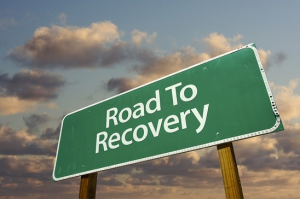Recovery Supporters Can Also Experience a Rough Road, But The Journey Is Still Worthwhile

Peter White, M.A., LPCC, Lindner Center of HOPE, Addictions Counselor
Many loved ones of people with substance use disorders are often discouraged by the severity and duration of distress initiated and endured by their loved ones. In a related manner, many professionals working with people with substance use disorders become disillusioned and discouraged by the extent of problems, and a lack of progress in treatment. It seems that experiencing burnout, or feeling just plain burnt, are two common emotional consequences of committing time and energy in trying to help people with substance use disorders. I would argue that one of the most important things we can do, being the people who care, is revisit our understanding of the fundamentals of substance use disorders, and reorient our recovery approach in a manner that aligns with these fundamentals.
Substance use disorders are chronic, behavioral disease conditions that if not addressed will progress into increasingly diseased states up to critical illness and death. They do not have a cure.
It is easy to be initially discouraged by this reality, until we consider an additional reality – substance use disorders are imminently recoverable. That is to say, at any time a person with a substance use disorder can make the changes that stop the progression of his or her disease process, ( a major accomplishment in itself,) and begin the process of establishing and consolidating a healthy and rewarding recovery. The bad news is that there is no cure. The good news is that once we accept this, we are then free to focus on the ever present possibility of sobriety, health and growth taking root as our loved one’s lifestyle.
Our real challenge is to remain continually present, authentic and hopeful as we develop interventions and support over the course of a disease and recovery process that will often endure for decades. Think about that. If we appreciate the nature of a chronic condition, then we acknowledge that the process of growth, as well as the potential threat to growth, is never over. In a way, I would say that the experience of burnout isn’t logical, because people with terrible conditions can and do get better all the time. It is the maintenance of this very realistic hope for the advancement of recovery in the face of the loss and distress of alcohol and drug use that is the most effective way to help our loved ones, as well as to prevent burnout for ourselves.
I once asked clients during a group to state what their definition of recovery was. I noticed that their answers really focused on the establishment and expansion of behaviors that were in line with their values much more than they were focused on the cessation of drug use -“Dealing with responsibilities, ”Complete change of focus, ”Knowing I can change and grow,” Doing my best- healthy, clean, sober, ”Becoming self-reliant.” It was a very reassuring moment for me as a helping professional in that the clients were not searching for a tabulation of “clean” days vs. “using” days. What they were really focused on was a direction that would incorporate every part of their lives away from risk, disease and loss, and towards the pride and enjoyment of health and growth that I think all people desire.
Let me end on a note where we do acknowledge that substance use disorders are often very destructive. If you are a loved one or a professional who is becoming overwhelmed or burdened too long by the losses you’ve encountered, lets acknowledge that disengagement and the establishment of boundaries are often the healthiest option for all involved. Disengagement does not need to be related to the rejection of people or the abandonment of hope for recovery. It is most often a very appreciable need for self-care in the face of risk and loss. Just as we help those with substance use disorders by decreasing our focus on the multiplicity and duration of problems, let’s help ourselves by not focusing on all the problems that we find we can’t deal with. Instead let’s focus ourselves on our limits relative to all the help we have or might offer, and remind ourselves that our own growth is imminently available, and that we should honor any rest we need until we able to make ourselves available for help once more.